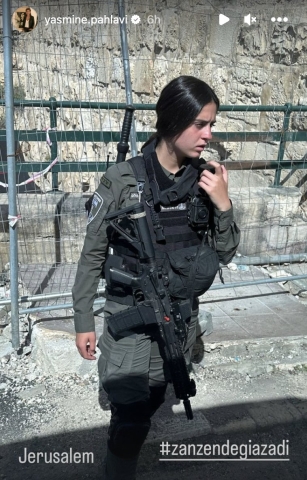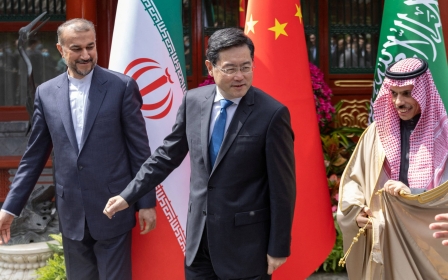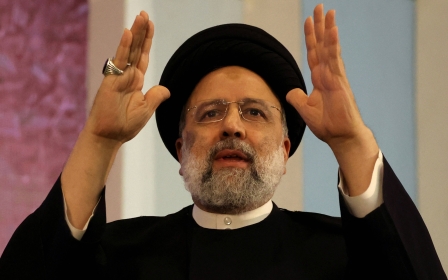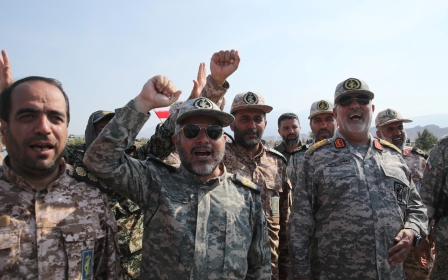Iran: Wife of Reza Pahlavi posts 'women, life, freedom' over image of Israeli soldier
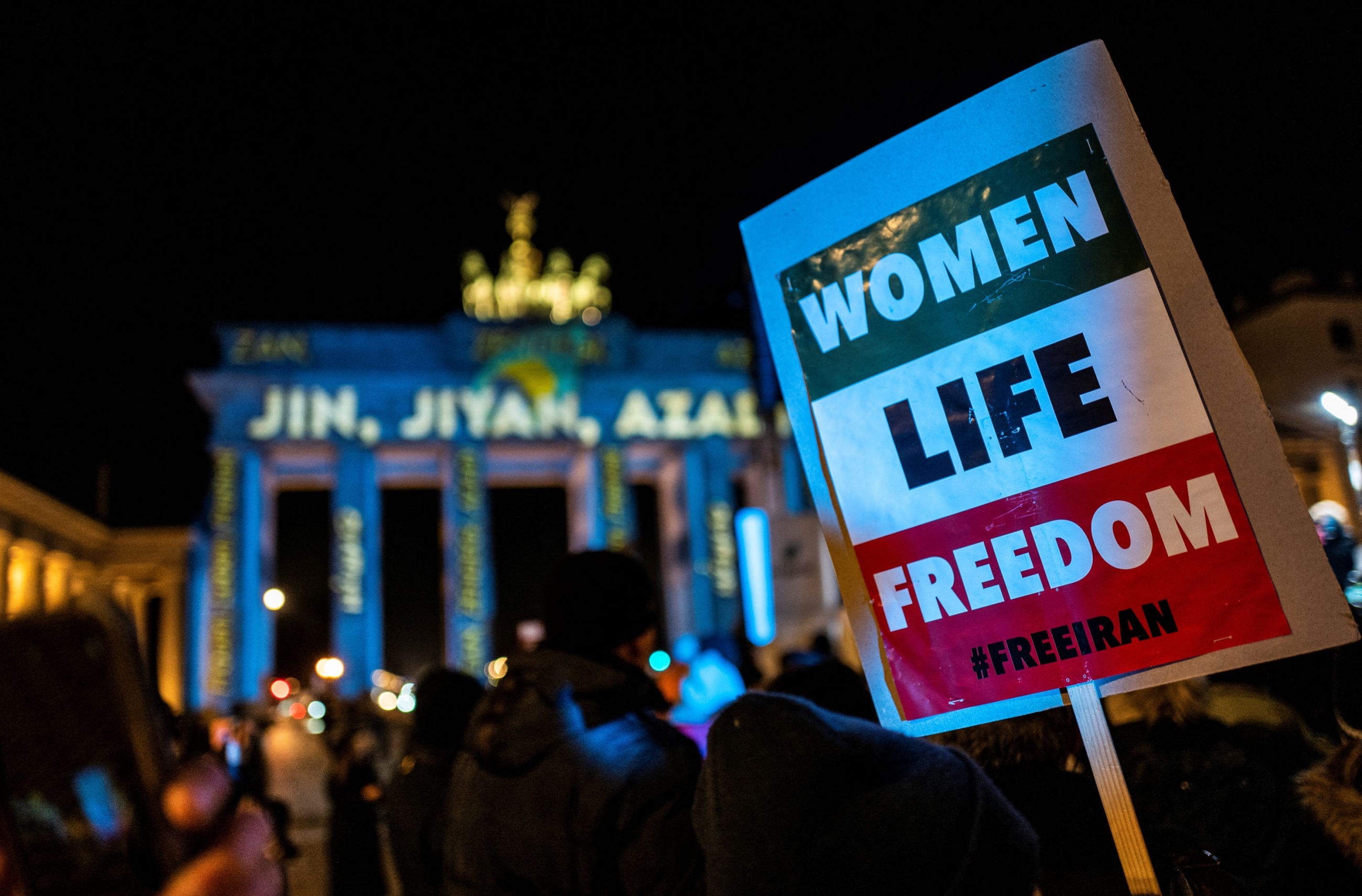
Since the September 2022 death of Kurdish woman Mahsa Amini in police custody for wearing an "inappropriate" hijab, the slogan "woman, life, freedom" has become a rallying cry for Iranians protesting against extensive state violence and repression of civil liberties.
So, when the daughter-in-law of Iran's former monarch posted #zanzendegiazadi (the slogan in Persian) on Instagram over the image of a female Israeli soldier, it produced more than a few baffled reactions.
Yasmine Pahlavi posted the image on Tuesday while accompanying her husband Reza on his trip to Israel, where the son of the former Iranian shah met with numerous officials, including Israeli Prime Minister Benjamin Netanyahu.
Reza Pahlavi has for many years sought to present himself as one of the main leaders of the Iranian opposition in exile, and since the beginning of the anti-government protests he has been a regular figure in international media and political circles.
However, many other opposition groups have been fiercely critical of him and his supporters, warning that Iranians would not accept removing the Islamic Republic only for a return to monarchy, citing the widespread human rights abuses and repression of dissent that occurred under his father, Shah Mohammed Reza Pahlavi.
'Grimly ironic'
Although Reza Pahlavi has called for a "secular, democratic" Iran to replace the Islamic Republic, both he and his wife have publicly defended his father's legacy.
Seamus Malekafzali, an Iranian-American freelance journalist who writes on Middle East issues, told Middle East Eye that it was grimly ironic to see the heirs to the Pahlavi dynasty using a slogan founded by the Kurdish leftists, which they crushed so ruthlessly, and applying it positively to the Israeli army.
"[It is ironic] that a slogan, which has found newfound popularity in Iran as a message not just against patriarchal impositions but against structural violence from the government, finds its way into a post supporting one of the most obvious and visible examples of structural violence from a government, the [Israeli army]," he said.
A number of commentators have also noted the irony of Yasmine Pahlavi using a phrase that originated with a Kurdish political movement linked to the Kurdistan Workers' Party (PKK) armed group in reference to an Israeli soldier.
During the early 1980s, many PKK fighters were based in Lebanon, where they received training from fellow Marxist-Leninists in the Democratic Front for the Liberation of Palestine (DFLP), and other Palestinian armed groups.
In 1982, Israel invaded Lebanon and the PKK aided Palestinian groups in fighting the Israeli army. At least 11 PKK fighters died during the conflict.
'Pahlavi's trip to Israel occurs as monarchists in the Iranian opposition increasingly butt heads with other factions'
- Matthew Petti, researcher
Matthew Petti, a Jordan-based researcher who has specialised in the Kurdish role in the Lebanese civil war, said associating the phrase with the Israeli army was bizarre considering it originated with a movement founded by "Kurdish exiles in Lebanon, where they were trained by Palestinian guerrillas and saw some of their first serious combat fighting against Israeli forces".
While the PKK itself was not formed until 1978 - during the dying days of the Pahlavi dynasty - the shah was a fierce opponent of Kurdish autonomy within Iran and regularly fought with other Kurdish separatist groups.
Perhaps the most prominent Kurdish opponent of the shah was the Democratic Party of Iranian Kurdistan (PDK-I), which supported the revolution that eventually ousted him.
The group has since become an opponent of the Islamic Republic, and its bases were targeted by Iranian air strikes during the anti-government protests.
During his visit to Israel, Reza Pahlavi visited the Western Wall Jewish holy site and was photographed wearing a kippah and praying.
He did not meet, however, with Palestinian representatives or officials of the Palestinian Authority during the trip.
The Pahlavi monarchy, which ruled Iran between 1925 and 1979, had been a close ally of Israel.
The Islamic Republic, formed following the overthrow of the Shah in 1979, has by contrast become Israel's archenemy and has regularly referenced the shah's alliance with Israel in its propaganda.
Petti said the trip appeared to be an attempt by Pahlavi to shore up support for the monarchist movement.
"Pahlavi's trip to Israel occurs as monarchists in the Iranian opposition increasingly butt heads with other factions, and as Saudi Arabia withdraws its support from the movement," he said, referring to Saudi Arabia's recent detente with Iran.
"It seems to be a gambit to portray Pahlavi as a leader who can secure renewed foreign support and make weighty decisions on the direction of the movement."
This article is available in French on Middle East Eye French edition.
Middle East Eye propose une couverture et une analyse indépendantes et incomparables du Moyen-Orient, de l’Afrique du Nord et d’autres régions du monde. Pour en savoir plus sur la reprise de ce contenu et les frais qui s’appliquent, veuillez remplir ce formulaire [en anglais]. Pour en savoir plus sur MEE, cliquez ici [en anglais].


